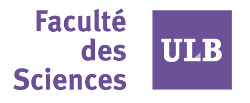PHYS-F-421
Nucleosynthesis
S. Goriely
Content
One of the major issues in modern astrophysics concerns the analysis and understanding of the present composition of the Universe and its various constituting objects. Nucleosynthesis models aim to explain the origin of the different nuclei observed in nature by identifying the possible processes able to synthesize them.
The composition of the various constituents of the Universe at the galactic and stellar scales has evolved since the Big Bang. Though the origin of most of the nuclides lighter than iron through the various hydrostatic and explosive burning stages in stars is now quite well understood, the synthesis of the heavy elements (i.e. heavier than iron) remains obscure in many respects. The major mechanisms called for to explain the production of the heavy nuclei are the slow neutron-capture process (or s-process) occurring during specific hydrostatic stellar burning phases, the rapid neutron-capture process (or r-process) believed to develop during the explosion of a star as a type II supernova or during the merging of two compact objects, and the photodisintegration process (or p-process) taking place in the high-temperature environment of type-Ia or type-II supernovae. The stellar nucleosynthesis requires a detailed knowledge not only of the astrophysical sites and physical conditions in which the processes take place, but also the nuclear structure and interaction properties for all the nuclei involved.
These lectures describe our present understanding of the stellar nucleosynthesis processes as well as the many experimental and theoretical efforts devoted to determine the related nuclear physics inputs of relevance. These include nuclear structure as well as decay and reaction properties of relevance in astrophysical environments. The specificity of such properties in a high-temperature astrophysical plasma will be emphasized. The lectures also describe the particular links developed between nuclear physics and astrophysics.
Some reference textbooks or reviews
- Principles of Stellar Evolution and Nucleosynthesis: D. Clayton (University of Chicago Press 1968, 1983)
- Supernovae and Nucleosynthesis: D. Arnett (Princeton University Press, 1996)
- Nuclear physics of stars: C. Iliadis (Wiley-VCH Verlag, 2007)
- Astronuclear Physics: A tale of the atomic nuclei in the skies:
M. Arnould, S. Goriely
Progress in Particle and Nuclear Physics (2020) - S-process nucleosynthesis: nuclear physics and the classical model:
F. Kappeler, H. Beer, K Wisshak
Reports on Progress in Physics 52, 945 (1989) - The r-process of stellar nucleosynthesis: astrophysics and nuclear physics achievements and mysteries:
M. Arnould, S. Goriely, K. Takahashi
Physics Reports 450, 97 (2007) - The p-process of stellar nucleosynthesis: astrophysics and nuclear physics status:
M. Arnould, S. Goriely
Physics Reports 384, 1 (2003)
Slides
(access restricted. To get access, please contact S. Goriely at sgoriely@astro.ulb.ac.be):
- L1: Chapter 1: Introduction to Nuclear Astrophysics
- Slides: Chapitre01.pdf (7.9Mb)
- Video (version 2024): chapter01.mp4 (180Mb)
- Video (version 2022): chapter01.tar (314Mb)
- L2: Chapter 2: Properties of nuclei
- Slides: Chapitre02.pdf (9.1Mb)
- Video (version 2024): chapter02.mp4 (201Mb)
- Video (version 2022): chapter02.tar (721Mb)
- L3: Chapter 3: Nuclear reactions in stars
- Slides: Chapitre03.pdf (6.8Mb)
- Video (version 2024): chapter03.mp4 (239Mb)
- Video (version 2022): chapter03.tar (360Mb)
- L4: Chapter 4: Primordial nucleosynthesis
- Slides: Chapitre04.pdf (4.8Mb)
- Video (version 2024): chapter04.mp4 (148Mb)
- Video (version 2022): chapter04.tar (125Mb)
- L4: Chapter 5: Stellar burning phases and related nucleosynthesis
- Slides: Chapitre05.pdf (13.2Mb)
- Video (version 2024): chapter05.mp4 (311Mb)
- Video (version 2022): chapter05.tar (274Mb)
- L5: Chapter 6: Nucleosynthesis of the elements heavier than iron
- Slides: Chapitre06.pdf (3.2Mb)
- Video (version 2024): chapter06-07.mp4 (558Mb)
- Video (version 2022): chapter06.tar (121Mb)
- L5: Chapter 7: The s-process nucleosynthesis
- Slides: Chapitre07.pdf (9Mb)
- Video (version 2024): chapter06-07.mp4 (558Mb)
- Video (version 2022a): chapter07a.tar (280Mb)
- Video (version 2022b): chapter07b.tar (69Mb)
- L6: Chapter 8: The r-process nucleosynthesis
- Slides: Chapitre08.pdf (14Mb)
- Video (version 2024): chapter08.mp4 (464Mb)
- Video (version 2022a): chapter08a.tar (331Mb)
- Video (version 2022b): chapter08b.tar (102Mb)
- Video (version 2020): chapter08.tar (347Mb)
- L7: Chapter 9: The p-process nucleosynthesis
- Slides: Chapitre09.pdf (3.5Mb)
- Video (version 2024): chapter09.mp4 (282Mb)
- Video (version 2022): chapter09.tar (154Mb)
- Video (version 2020): chapter09.tar (119Mb)
- L7: Chapter 10: Cosmic ray nucleosynthesis
- Slides: Chapitre10.pdf (3.1Mb)
- Video (version 2024): chapter10.mp4 (63Mb)
- Video (version 2022): chapter10.tar (39Mb)
- Video (version 2020): chapter10.tar (32Mb)
Additional papers for ULB students
- Solar r-process-constrained actinide production in neutrino-driven winds of supernovae
S. Goriely, H.T. Janka
MNRAS 459, 4174 (2016) - Non-standard s-process in massive rotating stars
A. Choplin, R. Hirschi, G. Meynet et al.
Astron. Astrophys. 618, A133 (2018) - Nuclear robustness of the r process in neutron-star mergers
J. Mendoza-Temis, M.-R. Wu, K. Langanke, G. Martinez-Pinedo, A. Bauswein, H.-T. Janka
Phys. Rev. C92, 055805 (2015) - The p-process in exploding rotating massive stars
A. Choplin and S. Goriely and R. Hirschi and N. Tominaga and G. Meynet
Astron. Astrophys. 661, A86 (2022)
